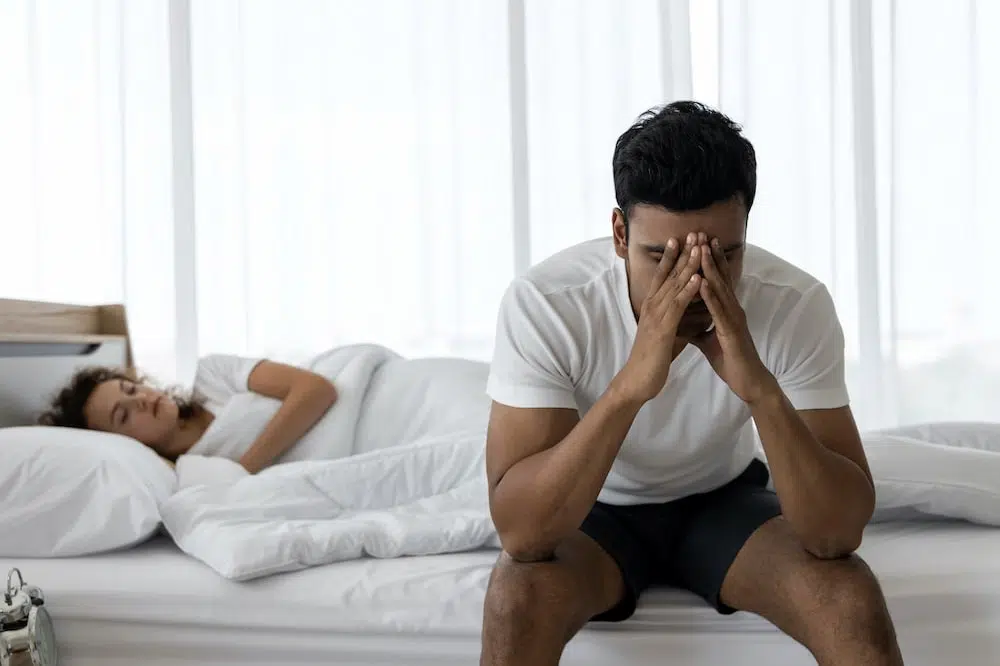
Can Sleep Apnea Cause Low Testosterone?
You know that feeling when you wake up after a great night’s sleep? You feel fresh, energetic, and ready to face the day.
But when your sleep gets interrupted, it can affect more than just your mood or energy. It can also have surprising effects on things like your hormone levels.
Sleep apnea is when you stop breathing for short periods while you sleep. It’s more common than you think and doesn’t just tire you. Researchers have found a link between sleep apnea and low testosterone in men.
Testosterone is an important hormone that affects many parts of the body. When its levels drop, it can cause problems. So, getting good sleep is not just about feeling rested – it’s also about keeping your body in balance!
Let’s discuss the details of whether can sleep apnea cause low testosterone levels.
Who Might Suffer From Sleep Apnea
Some things make people more likely to get sleep apnea:
- Being overweight: Extra weight, especially around the neck, can block the airway.
- Having a narrow throat: Some people are born with a little throat or enlarged tonsils, which can block the airway.
- Being male: Men are more likely to get sleep apnea than women. But women can get it, too, especially if they are overweight.
- Being older: Older adults are more likely to have sleep apnea.
- Family history: People with family members who have sleep apnea are more likely to get it.
- Using alcohol or sedatives: These can relax the muscles of the throat.
- Smoking: Smokers are more likely to get sleep apnea than non-smokers.
- Having a stuffy nose: A blocked nose makes breathing hard and increases the risk.
Understanding Low Testosterone
What Is Low Testosterone?
Low testosterone, often called “low T,” means the body doesn’t make enough of this hormone. Testosterone is a hormone that men’s bodies produce mainly in the testicles.
It helps men build muscles, deepen their voice, and grow facial hair. As men get older, their bodies sometimes produce less testosterone.
Symptoms Of Low T
When men have low T, they can feel different. They might feel tired or not want to do things they used to love. They can have a hard time sleeping or even feel sad.
Some men might find it hard to remember things, or they may not want to be close to someone they love.
Their muscles might get weaker, and they could gain weight. It’s also common for men with low T to have a low sex drive.
Causes Of Low Testosterone
There are many reasons a man can have low T. One reason is age. As men get older, they often produce less testosterone. But other things can cause it, too.
Injuries to the testicles, chemotherapy, or radiation treatments for cancer can lower testosterone.
Some diseases, like type 2 diabetes or liver and kidney disease, can also cause low T. Even some medicines can make testosterone levels drop.
Prevalence In Men
Many men deal with low T. Millions of men have this problem, especially as they age. Studies show that about 2 out of 10 men over 60 have low T. This number grows as men age.
The number is even higher by the time they reach 70 or 80. So, it’s a common problem, but doctors can help men find ways to deal with it.
The Connection Between Sleep Apnea And Low Testosterone
Research Findings
Doctors and scientists have studied sleep apnea and its effects on the body. Their studies found a link between sleep apnea and low testosterone. Men with sleep apnea often have lower testosterone levels than men without sleep apnea.
How Sleep Apnea Affects Hormones
When a person has sleep apnea, they stop breathing for short times during sleep. These breaks in breathing disrupt sleep. This disruption can mess with the body’s hormones.
Testosterone is one of the hormones affected. It’s a hormone that helps men feel strong and energetic. Without enough sleep, the body makes less testosterone.
Mechanisms At Play
The body makes most of its testosterone during deep sleep. But with sleep apnea, deep sleep can get interrupted.
This means the body has less time to make testosterone. Over time, this can lead to lower hormone levels in the body.
Impact On Male Health
Low testosterone can affect a man’s health in many ways. Men may feel tired or weak. They may have trouble thinking clearly.
They might also notice changes in their mood or body. For example, they could gain weight or have less muscle. All of this can make daily life harder.
Mutual Exacerbation Of Symptoms
Sleep apnea and low testosterone can make each other worse. When a man has low testosterone, he can gain weight.
Extra weight can make sleep apnea more severe. On the other hand, severe sleep apnea can lower testosterone levels even more. It’s a cycle that’s not good for the body.
Factors Contributing To The Link
Role Of Oxygen Levels
When we sleep, our bodies need a steady flow of oxygen. Sleep apnea stops people from breathing for short times. This means less oxygen reaches the body.
Low oxygen can affect many things, including our hormones. Testosterone is a hormone. When oxygen levels drop, the body may make less testosterone.
Influence Of Interrupted Sleep
Good sleep is essential for our bodies. Sleep apnea causes people to wake up many times during the night.
Even if short, these wake-ups can upset the body’s normal rhythm.
This rhythm helps control when and how much testosterone the body makes. So, bad sleep can lead to less testosterone.
Neuroendocrine Changes
Our brain controls a lot of things, including making hormones. The brain has special parts called the neuroendocrine system.
Sleep apnea can change how this system works. It may not tell the body to produce enough testosterone when it doesn’t work right.
Obesity And Hormonal Balance
People with sleep apnea often have extra weight. Being overweight can change the balance of hormones in the body.
Fat cells can affect how the body makes and uses testosterone. So, having more fat cells may lead to lower testosterone.
Genetic Predisposition
Some people have genes that make them more likely to get certain health problems. These genes can be passed from parents to kids. Some genes may make people more likely to have sleep apnea.
Other genes affect how the body makes testosterone. So, genes can play a role in the link between sleep apnea and low testosterone.
Diagnosis And Treatment Options
Diagnosing Sleep Apnea
Doctors use special tests to find out if someone has sleep apnea. One common test is called a sleep study. In this test, the person sleeps at a clinic. While they sleep, machines check how they breathe.
They measure the person’s heart rate and how much air they breathe in and out. If the person stops breathing often at night, they might have sleep apnea.
Diagnosing Low Testosterone
Doctors do a blood test to determine if a man has low testosterone. This test checks how much testosterone is in the blood.
Men usually get this test in the morning when testosterone levels are highest. If the test shows a low level, the doctor may ask for another test to be sure.
Common Treatment Options For Sleep Apnea
There are various ways to make sleep better. Doctors can suggest ways to keep air moving smoothly for sleep apnea, such as oral medical devices and/or PAP machines, to help you breathe better at night.
In some situations, surgery might be the only option to address the issue.
Treatment Options For Low T
Men with low testosterone have different treatment options. One way is using gel, patches, or injections. These give the body the testosterone it needs.
Some men might also take pills that help their body make more testosterone. Men need to talk to their doctor about the best treatment for them.
Coordinated Care By Healthcare Professionals
When a person has both sleep apnea and low testosterone, they need good care. Doctors, nurses, and other healthcare professionals work together. They make a plan that treats both problems.
This plan might include using various kinds of oral medical devices and/or PAP machines, and taking testosterone. The most important thing is to get the right care for both issues. This helps the person feel better and stay healthy.
FAQs
1. How Does Sleep Apnea Affect Testosterone Levels?
Sleep apnea can lower testosterone levels. When there are frequent breaks in breathing during sleep, the body’s oxygen drops. This can disrupt the normal production of testosterone during the night, leading to lower levels in the body.
2. Can Lack Of Sleep Affect Testosterone Levels?
Yes, lack of sleep can reduce testosterone levels. Consistent poor sleep affects the body’s hormone production, and testosterone is often decreased in men who don’t get enough rest.
3. Can Sleep Apnea Cause Hormone Issues?
Sleep apnea can lead to hormone issues. Disrupted sleep and low oxygen levels from sleep apnea can affect various hormones, including testosterone, stress hormones, and growth hormones, leading to imbalances.
Can Sleep Apnea Cause Low Testosterone?
Sleep apnea is a severe sleep disorder with several health consequences, including low testosterone. So, getting treatment to improve your overall health and well-being is essential if you have sleep apnea.
Testosterone is an important hormone that plays a role in many bodily functions, including sexual function, muscle mass, bone density, and energy levels. Low testosterone can cause various symptoms, including fatigue, decreased sex drive, erectile dysfunction, and mood changes.
You should talk to your doctor if you are concerned that you may have sleep apnea.
Many effective treatments are available. Treating sleep apnea can improve your testosterone levels and overall health.



